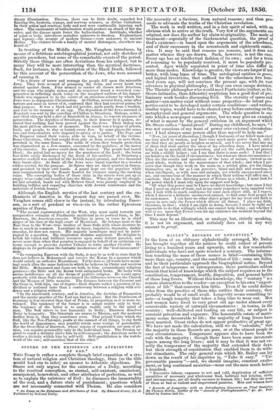STEERE ON THE EXISTENCE AND ATTRIBUTES
OF GOD.* `Pals Essay is rather a complete though brief exposition of a sys- tem of natural religion and Christian theology, than (as the title would lead one to infer) an answer to Atheistic objections. Dr. Steere not only argues for the existence of a Deity, according to the received conception, as eternal, self-existent, omniscient, omnipotent, benevolent, and other attributes of perfection, as well as to explain the existence of Evil : he discusses the immortality of the soul, and a future state of punishment; questions which we not necessarily connected with Theism. He also considers
• die Essay en the Existence and Attributes of God. By Edward Meese, LL.D. Published by Bell and Daldy.
the necessity of a Saviour, from natural reasons; and then pro- ceeds to advocate the truths of the Christian revelation.
The work is well written, and in a fair spirit of mind, with an obvious wish to arrive at the truth. Very few of the arguments are original, nor does the author lay claim to originality. The mode of treatment—especially of the fundamental question, the proof of God's existence—is based upon the arguments of le schoolmen, and of their successors in the seventeenth and eighteenth canto,. ries. It may be said that reasons are reasons, and it does not matter whence they are drawn. Such, however, is not the case. Every age has an intellectual fashion of its own ; and for a train of reasoning to be popularly received, it must be popularly pre- sented. Ages widely separated in point of time also differ in more than modes. Knowledge is greater, the views are larger if not better, with long lapse of time. The ontological entities in posse, and logical inventions, that sufficed for the schoolmen five hun- dred years ago, will not convince the present age, with its vast advances in physical philosophy, if they can even escape derision. The Theistic philosopher who wouldmeet Pantheistic (rather, as Dr. Steere intimates, than Atheistic) scepticism has a good deal of pre- liminary work besides discussing Evil. The eternity of space and matter—can matter exist without some properties—do latent pro- perties exist to be developed under certain conditions—and various similar topics, would have to be cleared away before entering on the metaphysical and general arguments. The whole vest-ion. is one into which a newspaper cannot enter, but we may give an example of what is meant by the general criticism in an argument which Dr. Steere calls a "moral proof." During my childhood, he says, "I was not conscious of my want of power over external circumstan- ces : I had always some person older than myself to help me." "Now, [at years of discretion,] though I find many of my fellow men excel me very much in wisdom, and have very much more power than I, still I see that they are nearly as helpless as myself, and I can never find any one of them that shall answer the ideas of my schoolboy days. I have need of help, I am by myself all but powerless, and yet the earth does not present me with a visible helper ; can I say that there is none such? I find that I am helpless in the hand of circumstances : but what are these circumstances ? They are the results and operations of the laws of nature, viewed as one great whole, working to the maintenance of that whole; and when I per- ceive that though they work in the main on a settled plan, yet the things themselves are, as far as I can perceive, blind and dull and senseless, or when intelligent,. as with men and animals, yet wholly unconcerned about me, and unconscious of the manner in which their actions will affect me, I conclude, that in the directing power of Nature as a whole, I must look for the power which I must rely upon for support and help. " Of what this power may be I have no direct knowledge ; but since I find that I need an object of trust, and in my early years have been supplied with one, I look with as much confidence for some such object still,, as I expect, when I discover a hitherto unobserved animal, to find some food proper for its sustenance. I can have no other object proper for my trust and aith to repose in save only the Power which directs all things. I place my faith, therefore, in that ; which I am right in doing, because I must be right and reasonable to do that willingly which one cannot help doing ; and whether I will or no, upon that Power even for my existence one moment beyond this time I must depend."
This may be an illustration or analogy, but, strictly speaking, it is not an argument, and certainly does not in any way amount to proof.


























 Previous page
Previous page